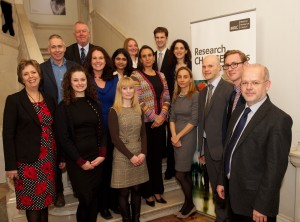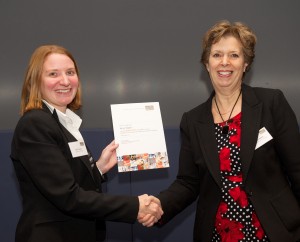Amy Taylor’s research, which relies heavily on international collaboration, has been awarded by the Medical Research Council in their Celebration of International Collaboration poster competition. Amy describes this work and the importance of international collaboration in her debut blog for TARG.
The Medical Research Council, one of the largest funding bodies for scientific research in the UK, celebrated its 100th birthday this year. To mark the occasion they have hosted a series of events in 2013, showcasing some of the incredible and life-changing discoveries that have been made by MRC scientists over the last century.
I was lucky enough to be part of the final event, a reception at the Royal Society on 10th December, celebrating a key aspect of the MRC’s work: international collaboration. They had invited MRC-funded early career researchers to submit abstracts explaining the importance of international collaboration to their work. As one of the 10 shortlisted applicants, I was asked to turn this into a poster to display at the event.
My poster focused on CARTA, the consortium for Causal Analysis for Research in Tobacco and Alcohol, which is made up of over 30 studies from 9 different countries. We are investigating whether smoking causes a range of physical and mental health outcomes. To do this, we use a method of analysis called Mendelian randomisation, which uses a genetic variant related to smoking heaviness in the population. This type of analysis often requires large sample sizes and we can achieve this by combining information from different studies. To date, CARTA has data on over 100,000 individuals. Forming CARTA has been one of my key roles in my first year since finishing my PhD and has taught me a great deal about the collaborative approach to scientific research.
The reception was a fantastic experience, highlighting the amazing breadth of the work of the MRC both past and present. We were treated to talks by eminent MRC researchers (including a Nobel prize winner) on developmental origins of disease, osteoporosis, HIV and TB and the structure of the ribosome.
For me personally, the event served as a reminder of why I have chosen this career path, which was sometimes easy to forget in the depths of PhD thesis writing! My fellow poster presenters worked on a diverse range of topics including bacterial motility, genetics of speech and language, childhood rickets in Bangladesh, zoonoses detection in Kenya and ageing in schizophrenia. It is easy to become very focused on your own tiny area of research, so it was great to have the opportunity to learn about other MRC-funded work from researchers at similar stages in their careers.
I was awarded second prize for my poster and received some funding to enable further collaboration. This can hopefully be used towards visits to meet some of my international CARTA colleagues, without whom the research I do would not be possible.
Dr Amy Taylor is a post-doc in TARG.


